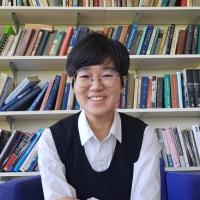Congratulations to the following Sociology Ph.D. students, who are 2024-25 East Asia Program Fellowship recipients. Hyo Joo Lee and Hao Liang received the Robert J. Smith Fellowship in Japanese and Korean Studies; and Zhipeng Zhou received the Lee Teng Hui Fellowship in World Affairs with East Asia Focus. Read more about their research below.
Hyo Joo Lee -- Robert J. Smith Fellowship in Japanese and Korean Studies
Consequences of Low Fertility and Gender Inequality in South Korea: Focusing on Childcare Center Availability
Hyo Joo’s dissertation project delves into the implications of rapid demographic shifts, focusing on South Korea, a nation grappling with one of the world’s lowest fertility rates.
While much of the existing research highlights the repercussions of declining fertility on population aging and economic growth, her project sheds light on the often-overlooked institutional and infrastructural transformations that directly impact the everyday lives of mothers and young children, particularly the availability of childcare centers. Using administrative data, Hyo Joo seeks to enrich the discourse on fertility decline by exploring the evolving landscape of childcare availability and its critical role in shaping gender inequality in the labor market.
Hao Liang -- Robert J. Smith Fellowship in Japanese and Korean Studies
Causes, Patterns, and Consequences of Ethnic Residential Segregation in Japan
This study examines the causes, patterns, and consequences of immigrant and ethnic minority residential segregation in Japan, an emerging new global destination facing severe population decline and labor shortage. Research in global new immigrant destinations, where new places become immigrant-receiving countries, has often been descriptive and limited to case studies. This approach has not fully uncovered the systematic patterns of immigrant integration in these societies. Residential patterns, an important aspect of immigration and a benchmark for other integration outcomes, are especially overlooked
as most studies focus on labor and economic outcomes. To address this gap, this study uses six waves of restricted-access census microdata from Japan (covering the years 1995, 2000, 2005, 2010, 2015, and 2020). This approach allows for a comprehensive examination of ethnic and immigrant residential segregation at different scales: individual micro-level decisions on residential choices (whether to live in an ethnic neighborhood), group meso-level differences (whether and why some groups are more integrated or segregated than others), and macro-level trends (how the segregation of immigrant groups compared to the Japanese majority has changed over the decades). This research is the first systematic investigation of immigrant residential segregation and integration in the Japanese context, offering insights and implications for other global new destinations facing similar demographic challenges.
Zhipeng Zhou -- Lee Teng Hui Fellowship in World Affairs with East Asia Focus
Market Transition, Employment Precarity, and Income Inequality in Contemporary
China.
When China's market-oriented economic transition meets global trends in precarious work, how do the market and redistributive coordination regimes in China's labor market collectively shape the mechanisms of resource allocation, alter the social stratification order, and lead to income inequality at both individual and societal levels? This study, by leveraging the widespread use of precarious work in China, explores how the evolution of precarity in employment characterizes both the persistence of the redistributive regime and the growth of the market regime in determining individuals’ life chances. Using China as a case, this project contributes to the literature on social stratification in post-socialist societies and precarious work in emerging market economies. Moving forward, this study aims to uncover the implications of precarious work experiences over the life course for social inequality and work values, and how those relationships are structured by social institutions beyond the market regime.









